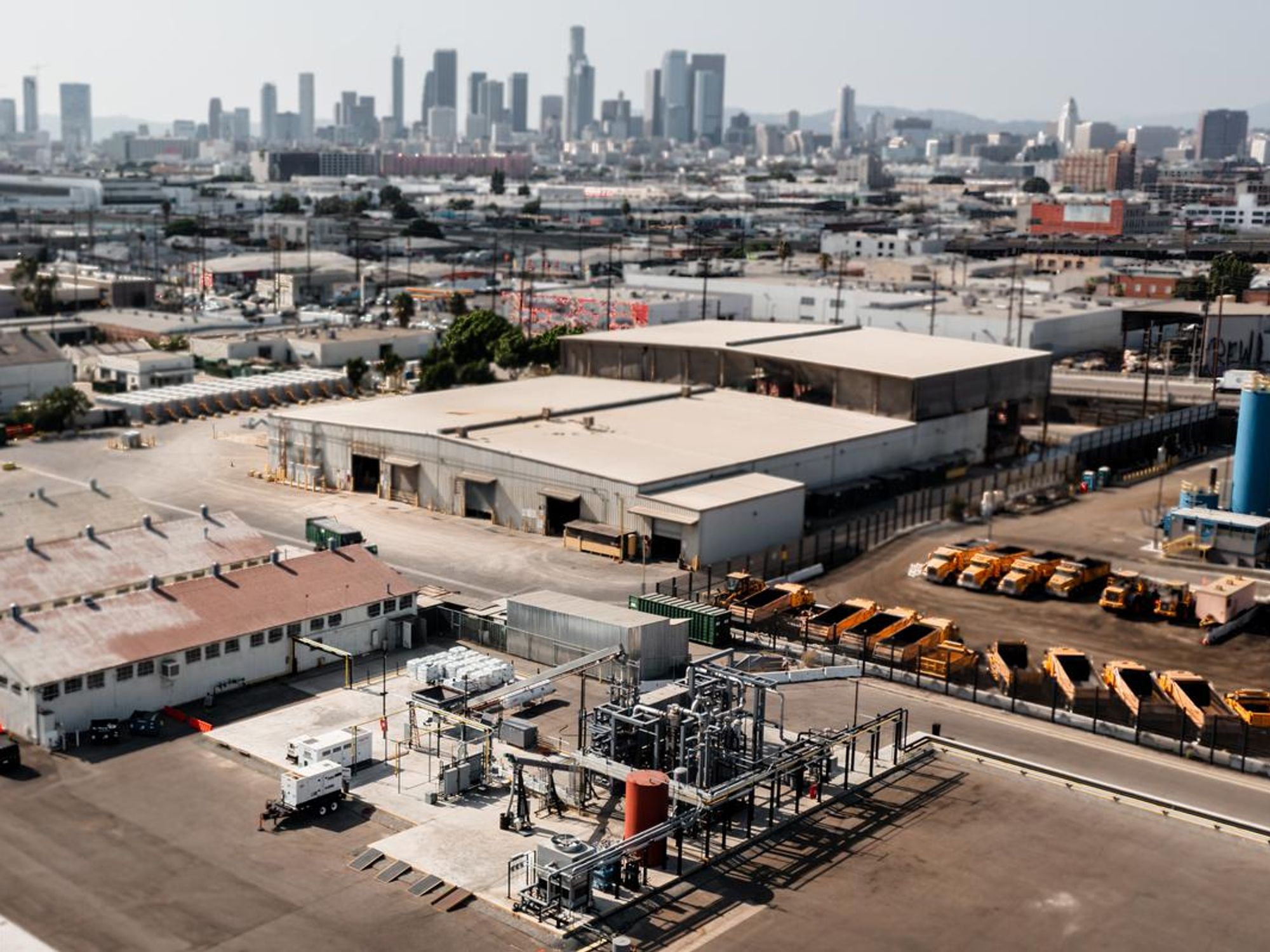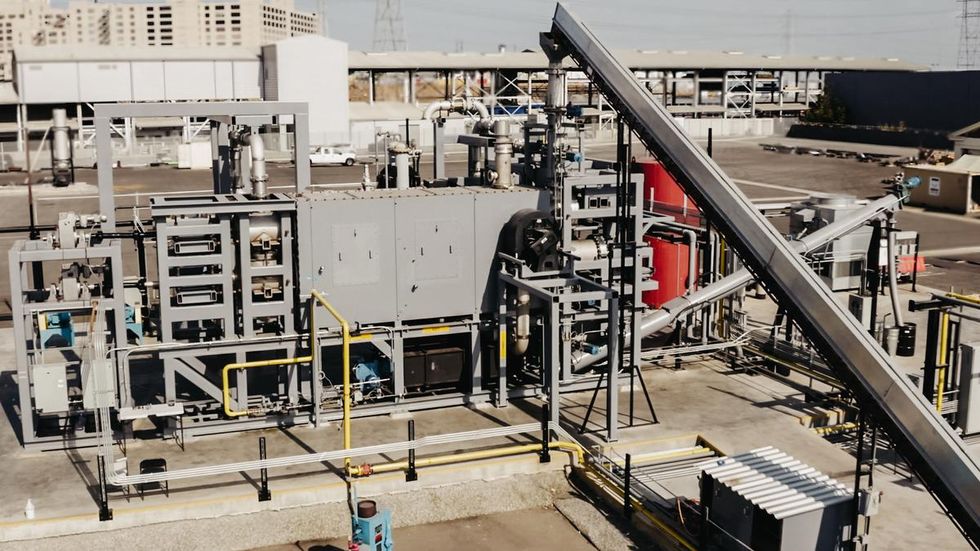Kore Infrastructure Is Turning Waste Into Clean Energy in Downtown LA
David Shultz reports on clean technology and electric vehicles, among other industries, for dot.LA. His writing has appeared in The Atlantic, Outside, Nautilus and many other publications.

Hydrogen accounts for roughly 70% of all matter in the universe—and these days, it seems that hydrogen power startups account for about the same share of emerging green-tech companies in California. But while the space is replete with big dreams using hydrogen to power planes, cars, buildings and more, most companies are still years away from finishing a prototype—let alone building a plant or going to market.
Not so for Kore Infrastructure. The energy startup is already online at its plant in Downtown Los Angeles, where it’s converting tons of waste into hydrogen, biogas, natural gas and carbon char every day.
The idea behind Kore’s technology is similar to that of other companies also deploying the process known as pyrolysis: You take organic waste like deadwood and brush, heat them in a low oxygen environment at a very high temperature, and collect the gasses and carbon char left over. When all goes well, this avenue of hydrogen production can be carbon negative, meaning that CO2 is removed from the carbon cycle that usually sees it burned into the atmosphere.
When a pile of manure is left in a field, for instance, it naturally converts into methane and CO2—two greenhouse gasses that warm the planet. But if the manure is fed into a pyrolysis machine, about half of that carbon is converted into solid carbon, also called char. In this form, the carbon atoms can’t be broken down by microbes and released as CO2. The element is then sequestered as a solid, and its potential to warm the atmosphere is eliminated.
Now, after 14 years of quietly developing and building its technology, Kore is coming out of stealth mode and ready to start selling its pyrolysis machines to practically anybody looking to process organic waste. The company’s machines can handle a variety of inputs—from nut shells, agricultural tree prunings and biosolids to construction and demolition waste.
“The big differentiator with Kore is having steel on the ground, having something operational, having something to show,” Kore founder and executive chairman Cornelius Shields told dot.LA. “If you're going to build these types of facilities, you have to go through a lot of pain.”
Part of the reason that Kore suddenly seems to be at the forefront of the pyrolysis race is that it’s had a considerable head start. The company has been quietly operating since 2008 and built its first full-scale pyrolysis machine in 2015. These machines are massive, occupying a real estate footprint of close to an acre; to the untrained eye, they look like an unholy amalgamation of pipes, tanks and valves. At maximum capacity, one of the machines can process 24 tons of feedstock per day to produce 1,000 kilograms of green hydrogen and six tons of solid carbon char.

Kore’s technology eventually drew the interest of SoCalGas, which provided a $1.5 million grant in 2017 that allowed the startup to begin setting up operations in Downtown L.A. By August 2021, the company had completed permitting and construction of the plant and began running its pyrolysis machine as a proof of concept for commercial applications.
“We have been pretty quiet,” Shields said. “As a founder, I just wanted to make sure that we were ready [and] that the technology was working before we came to market—that we knew we had real data, and it just wasn't a hope and a prayer.”
While Kore is still coy on its exact business strategy going forward, Shields says it's fair to estimate that a pyrolysis machine will cost up to tens of millions of dollars to purchase. That’s not a small chunk of change—but compared to the cost of building a full pyrolysis plant, which can cost $100 million or more, Kore thinks it may be able to entice buyers.
“We're selling modular systems to industry,” according to Shields. “That kind of scaling is far faster because an industrial client can say, ‘Okay, let's do two modules to start. Let's see how that goes, and then we can add other modules.’”
Pyrolysis’ appeal is bolstered by financial incentives like the California’s Low Carbon Fuel Standard (LCFS) tax credits and the federal 45Q tax credit, which award companies for saving and sequestering carbon emissions. Then there’s the hydrogen itself, which currently costs about $10 per kilogram at the gas pump if you drive a hydrogen car. And even the char left over from the process is valuable: The solid carbon can be used in fertilizers and to strengthen concrete, but it can also be burned as a coal substitute. (Obviously, burning the char undoes all the hard work of sequestering the carbon in the first place—but for hard-to-decarbonize industries like steel and cement production, a carbon-neutral fuel source is a massive improvement over coal.)
“We can decarbonize transportation fuels in the state [and] decarbonize the supply chain for natural gas—and then use the same technology to make hydrogen as demand for that ramps up,” Kore executive vice president Steve Wirtel told dot.LA. It’s this sort of double-edged benefit that makes Kore’s technology exciting for Wirtel: Pyrolysis converts carbon that would otherwise warm the planet into a coal substitute, and produces green hydrogen in the process.
Given those multiple revenue streams, pyrolysis is becoming an increasingly attractive waste disposal avenue, and Kore is hoping to have its first commercial machine sold and delivered to a customer by the end of this year. The company is also looking to raise an “institutional round of capital,” Shields said, citing interest from private equity investors.
He added that Kore is already drawing international interest in its technology, but is planning to stay conservative for the time being and focus on scaling locally—part and parcel of the slow and deliberate pace that’s served the company well to this point.
“There's so much opportunity in our backyard in California, that's where we're going to stay for now,” Shields said.
- Hydrogen Energy - dot.LA ›
- The Price of Human Composting in California - dot.LA ›
- The Price of Human Composting in California - dot.LA ›
- GreenWealth Energy on Efficient EV Charging - dot.LA ›
David Shultz reports on clean technology and electric vehicles, among other industries, for dot.LA. His writing has appeared in The Atlantic, Outside, Nautilus and many other publications.




 Image Source: Skyryse
Image Source: Skyryse
 Image Source: Northwood Space
Image Source: Northwood Space